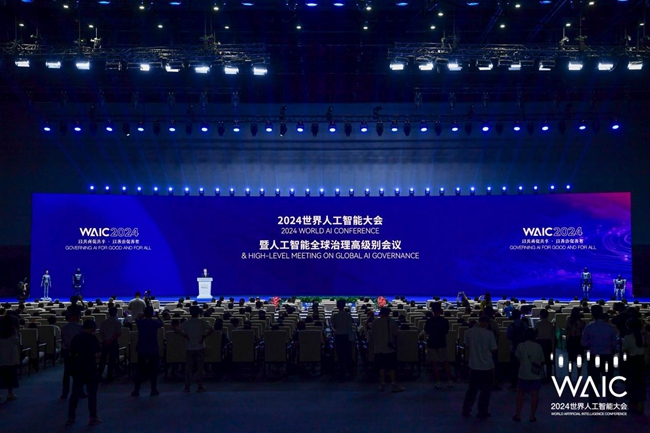WAIC 2024 wraps up in Shanghai with fruitful outcomes

Scenic view of Shanghai's Lujiazui area showcasing the banner of the 2024 World Artificial Intelligence Conference and High-Level Meeting for Global AI Governance event. [Photo/WAIC 2024]
The World Artificial Intelligence Conference and High-Level Meeting for Global AI Governance (WAIC) came to an end on July 6 in Shanghai.
The event was attended by more than 1,300 influential figures from over 50 countries attended the event, including laureates of international prestigious awards and global academicians.
Notable outcomes from the conference included the signing of 24 major industrial projects worth over 40 billion yuan ($5.5 billion). The event also facilitated the connection of 132 procurement groups, resulting in 126 project demands and an anticipated procurement amount of 15 billion yuan.
The event, which ran until July 7, attracted over 300,000 visitors by 2 pm on July 6, nearly doubling last year's attendance.
Spanning 52,000 square meters, the WAIC 2024 showcased more than 1,500 exhibits from over 500 companies. The event unveiled 50 new products, 100 large models, and 18 humanoid robots, including China's first full-sized general-purpose humanoid robot with an open-source.
A pioneering 6,000-square-meter All-Domain Linkage Pavilion was unveiled during the conference, emphasizing the importance of collaboration and inclusivity in AI development.

The 2024 World Artificial Intelligence Conference and High-Level Meeting for Global AI Governance closes on June 6 in Shanghai. [Photo/WAIC 2024]
At the closing ceremony, the Shanghai Artificial Intelligence Laboratory inked agreements with nine organizations to enhance the general-purpose large model and foster collaborative innovation.
In addition, two major municipal public service platforms were launched at the event, along with the inking of key AI project contracts in Shanghai that cover areas such as large models, embodied intelligence, and intelligent computing ecosystems.
WAIC 2024, co-hosted by various ministries and the Shanghai Municipal Government, saw the official release of the Guidelines for Humanoid Robots Governance at a sub-forum, marking a significant step towards ethical AI development.
The guidelines, comprising of six sections with 30 rules in total, aim to ensure the ethical and safe development and application of humanoid robots, emphasizing continuous protection of human rights and safety in the use of humanoid robots.
Shi Jianzhong, vice-president of China University of Political Science and Law, emphasized the importance of leveraging technological advancements for institutional growth and national competitiveness, advocating for a legal framework that fosters AI development.
Shanghai's leadership in AI governance was underscored, with initiatives like provincial AI legislation, the establishment of Artificial Intelligence Ethics Experts Committee, and key documents promoting ethical AI development and societal order.
Source: Jiefang Daily